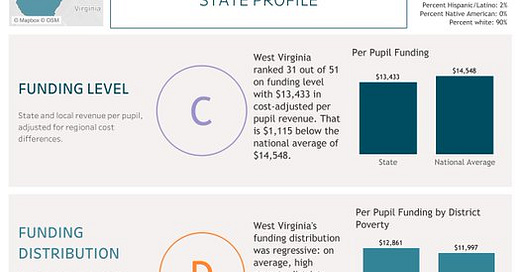Lawmakers in West Virginia and Kentucky last week passed legislation that would create school voucher programs in those states. Both states saw teacher strikes in recent years over school funding and teacher pension issues. Now, policymakers there are planning to divert public dollars to fund unaccountable private schools.
WSAZ-TV in West Virginia reports:
The opportunity is coming in the form of the Hope Scholarship Fund, an educational savings account that allows families to access up to $4,600 of state funds to educate their child at home or in a private school, among other options.
State leaders are calling this program the most expansive of its kind in the nation. Parents would receive the funding in the form of a voucher and it would need to be spent with state-approved vendors.
Gov. Jim Justice is expected to sign the bill.
West Virginia’s current funding situation is problematic at best, and education advocates suggest this bill will only make that worse.
Meanwhile, in Kentucky, school voucher legislation passed by only a single vote in the House. There, Gov. Andy Beshear is expected to veto the bill. Still, its passage raises concerns about the push for privatization. And, there is the possibility the legislature could override Beshear’s expected veto.
By just one vote, the Kentucky House passed House Bill 563, the Senate approved it 21 to 15.
It sets up the Education Opportunity Account Program, with the bill language saying it will give more flexibility and choices in education and address disparities in options. To do that, critics say it takes millions away from public schools.
“It is a tax credit. So, it is going to take away money from our general fund, which funds all public services, not just public schools,” said Eddie Campbell, Kentucky Education Association.
It’s kind of amazing and perhaps Orwellian that lawmakers consistently refer to schemes that divert public money from public schools and weaken education systems as “Education Opportunities.” The same tired rhetoric was used in Tennessee when Gov. Bill Lee secured passage of school voucher legislation there.
Now, of course, Tennessee is embroiled in a different kind of funding fight. This time, education advocates and public school leaders are practically begging Gov. Lee and lawmakers to invest a significant portion of the state’s unprecedented surplus on schools. So far, Lee and his allies are resisting this common sense call for much-needed school funding.
The Nashville Public Education Foundation said this past week that the state’s school funding formula (BEP) creates an “unattainable burden” for school systems:
“Bottom line, the BEP consistently underestimates what it takes to run schools and places an unattainable burden on local districts to pick up the difference,” said Katie Cour, president and CEO of the Nashville Public Education Foundation, in a statement.
“Too often people feel relieved when they hear the state has ‘fully funded the BEP,’ but this statement is essentially meaningless. Tennessee is grossly underfunding schools that serve one million students each year – more than 82,000 just in Nashville,” she said.
Additionally, public education advocates from across the state called on Education Commissioner Penny Schwinn to stop hiding behind lies and fake statistics and start pushing for fully-funded schools:
Mark Twain once said, “There are three kinds of lies: lies, damned lies, and statistics.” Schwinn has used statistics to paint a picture of a situation that is not nearly as dire as she led the General Assembly to believe.
Tennessee cannot afford to delve into lies when it comes to flunking over half of our third-graders and costing our school districts millions in yet another underfunded and unproven state mandate. Resources must be allocated based on factual data focusing on students who truly struggle to read on grade level.




